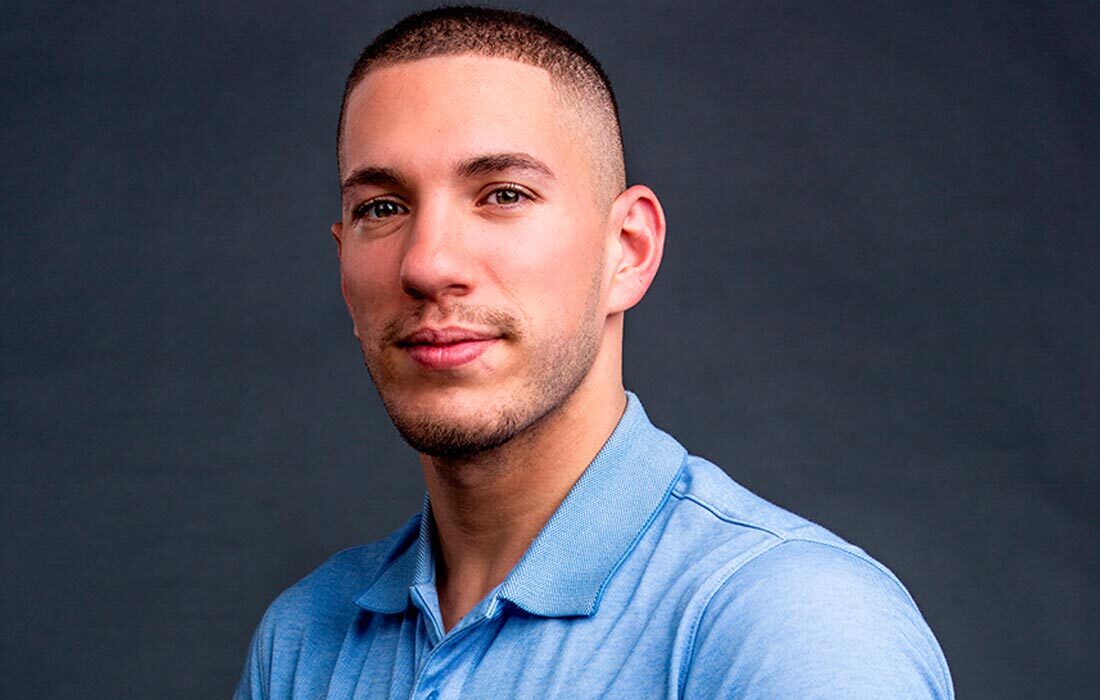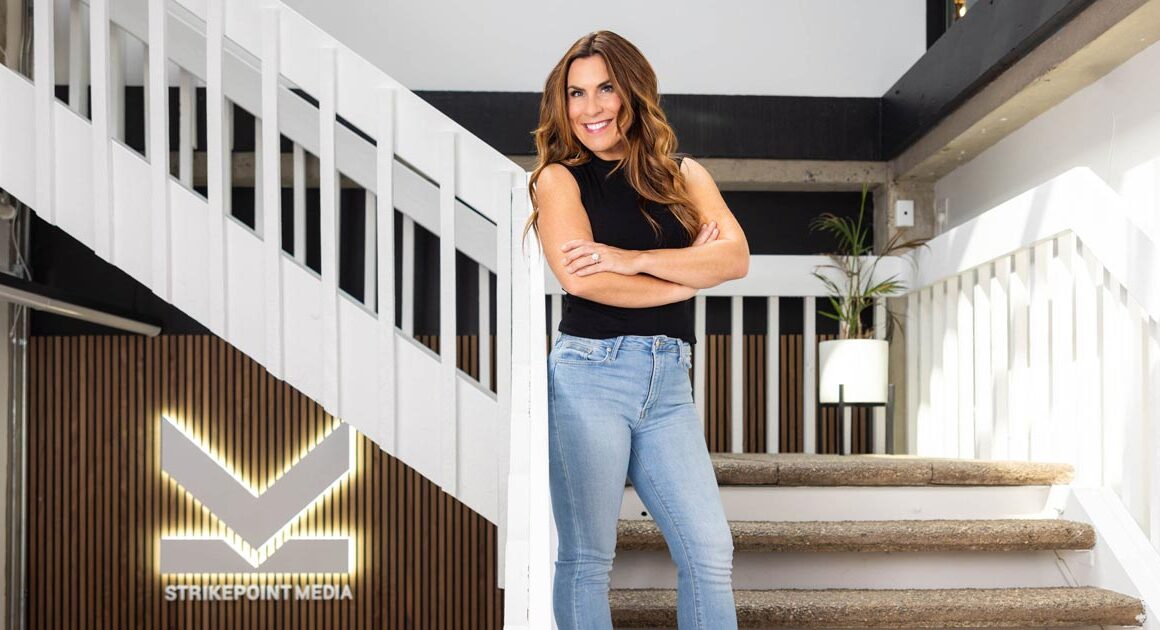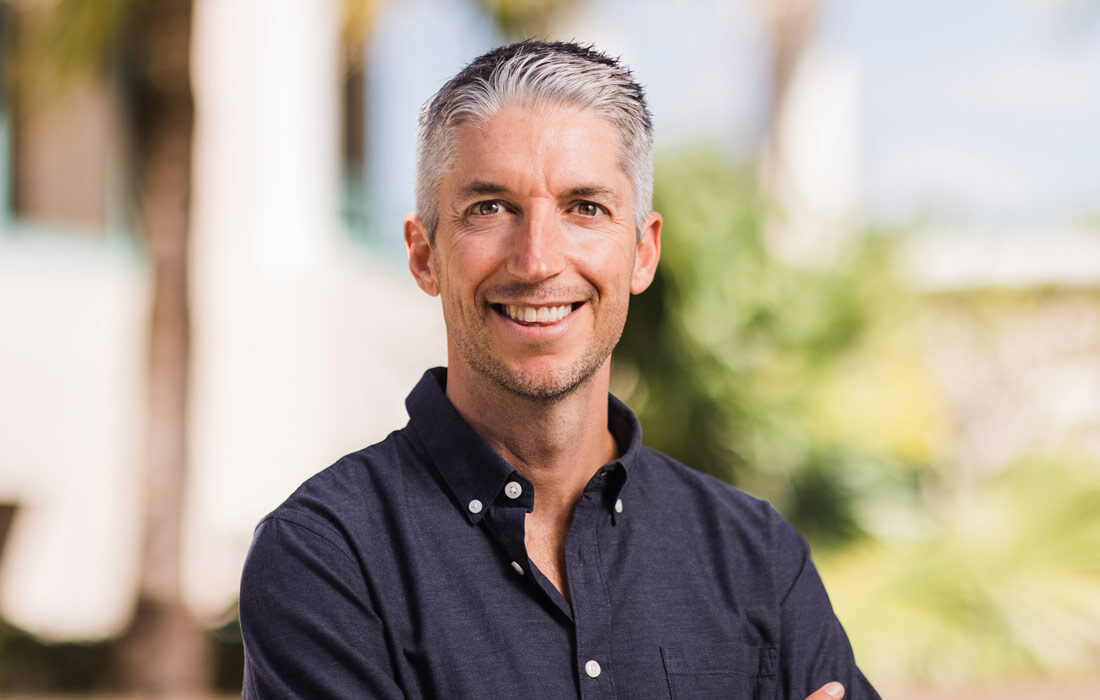“My sessions are methodically put together to take [attendees on] an emotional roller coaster,” Nick Santonastasso says. You can expect to dig deep and work to overcome or heal during an event.
Before becoming a professional speaker—appearing on stage with Tony Robbins and at events for Thrive, Lockheed Martin, the University of Florida and more, as well as teaching MasterClass workshops—Santonastasso was a professional prankster and bodybuilder.
From prankster to speaker
When he was young, Santonastasso wondered what he’d do when he grew up. Stepping on stage wasn’t his first thought, although now he recalls that his dad mentioned he could be a sports announcer or speaker.
“I was always worried about how I was going to make ends meet with no legs and one arm. I can’t work a regular job,” Santonastasso says. While in the womb, he was classified with Hanhart syndrome, a rare condition that leads babies to be born with underdeveloped limbs, an underdeveloped tongue or missing fingers and toes. In Santonastasso’s case, he was born without legs, with a left arm with one finger on it and an underdeveloped right arm.
Still, despite his dad’s career wisdom, becoming a speaker “wasn’t actually in my awareness,” Santonastasso says.
First came other ventures.
For instance, at age 18, he had a stint as a professional prankster, growing a following on the now-defunct social media platform, Vine, and finding fame through a variety of pranks, including giving Norman Reedus, a cast member of The Walking Dead, a shock. But pranking didn’t fulfill him, and in his 20s, he moved to Tampa, Florida, to pursue bodybuilding. He figured, “Not many people with no legs are in shape and bodybuilding. So if I can do it, people will watch.”
While in Tampa, Santonastasso attended an event for entrepreneurs and met his future business partner, who heard his life story and predicted he’d make it on stage with Robbins one day.
With that, Santonastasso began a career in speaking.
While making money and building a career were his initial goals, he realized there was a higher level to achieve after attending one of Robbins’ events and witnessing the transformation taking place. “I’ve watched this man make people cry and laugh and smile and break through and heal things,” Santonastasso remembers. His takeaway: “Whatever he’s doing, I want to do it at that level.”
Leading crowds to breakthroughs
There’s so much that Santonastasso loves about speaking at events. For one, he says, “I love the art and mastery of being able to orchestrate a crowd.” But there’s more too. He’s also passionate about that moment when audience members reach a breakthrough, “a moment where they heal something or think about life in a totally different way.”
Realizing how much he enjoyed speaking and how much of an impact he could have doing it, Santonastasso got to work. He began to develop his ability to talk about topics like psychology and neuroplasticity, a person’s ability to rewire their brain. In some ways, his strength as a speaker is his ability to condense time for other people by sharing a map toward healing with them based on his own healing journey from the traumas he’s endured.
During one of Santonastasso’s main sessions, you can expect three parts: First, he tells a story about himself or something he’s discovered or learned. Next, he teaches a specific lesson. Finally, he provides a tool in the form of one question or a series of questions, which Santonastasso says helps guide attendees to their own answers. “I can ask the audience a very powerful question, and they’re going to find a very powerful answer.” The questions help people realize experiences or thought patterns that aren’t helpful and may be holding them back in many areas of their lives.
While he shares personal stories, his speaking events aren’t about him, Santonastasso clarifies: They’re about leading the audience to breakthroughs. And these are truly transformational moments. People leave calling others to share their new insights, Santonastasso says. He’ll hear feedback like, “This felt like 10 years of therapy in one hour.”
You can expect to feel emotional during the event—and afterward. There’s a power to asking questions, Santonastasso says. When we ask intelligent and intentional questions, he says, we can uncover things about ourselves that may be healing and liberating.
On stage at Tony Robbins events
Even before Santonastasso entered the speaking world, he admired Robbins and the work he did on stage. When he finally attended an event, he was in awe of Robbins’ abilities. He and his partners worked to get on Robbins’ radar for two years, even speaking for free at one of his youth leadership conferences in California.
Years passed since Santonastasso attended his first Robbins event. And then, finally, he was invited to speak at an Unleash the Power Within (UPW) event in Dallas, Texas. The reaction was positive, and since then, Santonastasso has been a guest speaker at more UPW events, spanning the globe from Miami to Singapore.
Devoted to speaking and coaching
Speaking is Santonastasso’s great passion. He makes guest appearances (as with Robbins) and keynotes events. But it’s not the only way he connects with people to deliver transformational experiences.
He also has an online education company. “We offer people the opportunity to go deeper on my courses and my mentorship and masterminds,” he explains. Through this company, he helps others—coaches, experts and entrepreneurs—become transformational speakers, sharing what he’s learned in his own time building a speaker empire.
Share what you know—because someone needs your message
“Everyone has a story,” Santonastasso says. “And every day that you don’t share your story, there’s someone out there suffering because they haven’t met you yet.”
Like music, Santonastasso says, people have opinions on speakers and their messages. That is, not every speaker will appeal to everyone. When you’re authentically yourself, you’ll attract some people and repel others, he says. But this is helpful. “You’re going to repel the ones that will never do business with you anyway. You’re gonna attract your tribe that would love to go deeper on the journey of transformation with you.”
If you’re someone who feels like you have a story to tell the world, Santonastasso encourages you to do so. “Everyone has something valuable to share with the world. And there are people out there that need you.”
Want to book Nick Santonastasso as the keynote speaker for your next event? By booking with the SUCCESS® Speakers Bureau, you can be confident in working with a legacy brand. You also receive logistical support and professional guidance.



